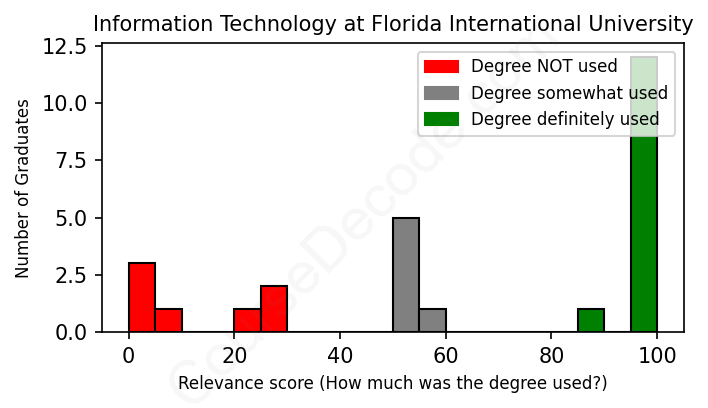
First, some facts. Of the Information Technology graduates from Florida International University we've analyzed , here's how many have used (or NOT used) their degree in their career:

These are estimates based on AI analysis of 26 LinkedIn profiles (see below).
The verdict? Slightly below average. Overall, with an average relevance score of 64%, Information Technology graduates from Florida International University have a slightly lower likelihood (-3%) of finding work in this field compared to the average graduate across all fields:
And for comparison, here's the chart for all profiles we've looked at across all degrees.
Also, after graduating, only 3% of these graduates have pursued further education other than another Bachelor's degree (such as a Masters degree or other), compared to the average across all profiles of 35%. This suggests a Bachelors degree is enough for most Information Technology graduates, and it's normal to look for work straight after graduation.
See the details:
|
Relevance score: 100% We think this person has gone into a career highly relevant to their degree. We think this person has gone into a career highly relevant to their degree.
DEGREE INFOGraduated in 2023 from Florida International University with a Bachelor of Science - BS in Information Technology. No other secondary education since. JOB HISTORY SINCE GRADUATIONSoftware Engineer Contractor Connection Jun 2023 - Present ABOUTAs a dedicated Software Engineer with a robust background in IT and a proud service history as a U.S. Marine, I blend cutting-edge technical skills with unwavering discipline and team-oriented dynamism. I specialize in developing scalable web solutions, with a keen focus on creating intuitive user experiences. My military service taught me the value of adaptability and precise execution, qualities I bring to every project. I thrive in environments that challenge my problem-solving abilities and offer opportunities for innovation. |
The top 10 most common jobs done by the graduates we've analyzed (ranked most common to least) are:
From the analysis of LinkedIn profiles, it looks like graduates from Florida International University who studied Information Technology have landed quite a variety of jobs. The most common roles include positions such as IT Technicians, Help Desk Analysts, Systems Administrators, and other tech support roles which directly make use of the specific skills they picked up in school. In addition, some graduates have moved on to roles like Software Engineers and IT Analysts, where technical expertise is crucial. These positions seem to align well with the knowledge and training emphasized in their Information Technology programs, showing a clearer connection to their education.
However, not all the jobs listed are relevant to Information Technology. There are quite a few grads who have taken up roles that steer away from tech, like coaching positions or office management roles, which don't really call upon the IT skills one would expect from their degree. It’s interesting to see that while some graduates are fully diving into IT-related careers, others veer off into entirely different fields. Overall, while many jobs are indeed relevant to their IT backgrounds, it seems there’s a noticeable number of grads who aren't fully utilizing their degree in their current positions. So, it really varies a lot from person to person!
Here is a visual representation of the most common words in job titles for Information Technology graduates (this is across all Information Technology graduates we've analyzed, not just those who went to Florida International University):

When looking at the career paths of graduates from Florida International University with degrees in Information Technology, you'll see a variety of outcomes, typically leaning towards roles that are closely tied to IT. Many of them kick-start their careers in positions like technical support or IT specialist roles right after graduating, which is pretty common and a good entry point into the industry. Over the years, some have climbed the ladder to roles such as systems administrators and business relationship managers, demonstrating a solid growth trajectory. It seems that after five to ten years, many graduates are working in dedicated IT roles, often settling into specialized positions within organizations or even moving into consulting and management roles.
However, there are a few exceptions in the mix. For instance, some grads end up in jobs that are not directly related to their IT training, such as office managers, real estate agents, or even starting their own businesses in coaching or design. This indicates that while the degree provides a strong foundation, not every graduate is sticking strictly to traditional IT careers or moving up in the field as expected. Overall, though, it seems like a good number of these graduates are finding relevant and promising careers in Information Technology, particularly as they gain more experience and specialize further in their chosen fields.
Honestly, the Bachelor degree in Information Technology at Florida International University (FIU) is pretty standard in terms of difficulty—so it’s a mix of both manageable and challenging parts. You’ll dive into topics like programming, networking, and database management, which can get intense if you're not super into math or tech stuff. But if you’re interested in computers and have some basic problem-solving skills, you’ll likely find it easier than, say, engineering or a hard science degree. It's definitely doable with some dedication and good time management. Just keep in mind that, like any degree, it will have its tough moments, but for motivated students, it feels pretty achievable!
Most commonly, in the LinkedIn profiles we've looked at, it takes people 3 years to finish a Bachelor degree in Information Technology.
Looking at the career paths of these Florida International University IT grads, it seems like most of them are doing okay financially, although there’s a bit of a mixed bag. Some, like those who started in support roles, seem to have progressed into better-paying positions over time, especially those who stuck around the university or moved to big companies like IBM or Deloitte. Others, especially in more niche roles or those who pivoted to coaching and other jobs that aren't purely IT, might not be raking in the big bucks. Overall, it looks like many have a decent shot at making a good living, especially as they gain experience, but it varies quite a bit between individuals and their specific career choices.
Here is a visual representation of the most common words seen in the "about" section of LinkedIn profiles who have a Bachelor degree in Information Technology (this is across all Information Technology graduates we've analyzed, not just those who went to Florida International University). This may or may not be useful:

Here are all colleges offering a Bachelor degree in Information Technology (ordered by the average relevance score of their Information Technology graduates, best to worst) where we have analyzed at least 10 of their graduates: